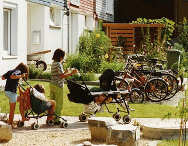 Mercedes, Porsche, Audi, BMW, VW. The auto lies at the heart of the German economy and culture. But one small corner has taken a stand against the tyranny of four wheels by creating an entire car-free community.
Mercedes, Porsche, Audi, BMW, VW. The auto lies at the heart of the German economy and culture. But one small corner has taken a stand against the tyranny of four wheels by creating an entire car-free community.
If you want a car in Vauban, you must buy a parking space in one of the municipal garages on the fringes of town. It’ll cost you close on $40,000, but you wont be able to drive your car anyway because Vauban has almost completely dispensed with metalled roads.
Instead of strips of grey tarmac, this suburb of Freiburg with 5000 inhabitants has streets and pathways that are cobbled or gritted or turned into flower gardens and playgrounds. Most streets do not permit cars at all, and houses are prohibited from having driveways or garages. Implausible though it may sound, the Vauban experiment is succeeding. 70% of households have chosen to live without a private car and 57% actually sold their cars when they moved to Vauban.
“If you want to get around in Vauban you walk, ride a bike or hop on the ultra-efficient tram service that connects us to Freiburg in 15 minutes. If you want a car to go on holiday or to shift things, hire one or join one of the town’s car-sharing schemes,” explains Andreas Delleske one of the founders of the Vauban project.
It’s a brave initiative. But Vauban’s auto-ban is only the first step in an ambitious social experiment aimed at creating a blue print for a new low impact way of life, says Delleske.
The suburb is almost entirely new and was built as “a sustainable model district” on the site of a former Nazi barracks. They were taken over by the French army at the end of the second world war and renamed Quartier Vauban. After the reunification of Germany the French handed it back to Germany and it was rapidly occupied by members of the burgeoning German squatters movement.
Many had taken part in the anti-nuclear movement as students in the 1970s and 1980s. and they set up the Forum Vauban, which began negotiating with the city government. “The founders were particularly concerned to offer an eco-friendly alternative to nuclear power,” explains Delleske. One practical way they could address the issue was by developing a community that was less reliant on the grid for its energy needs.
A group of housing associations evolved which commissioned architects to design new and ecologically sustainable homes on the site. Most of the old barrack buildings were torn down and more than 60 architects were employed to redesign Vauban. Its three- to five-storey buildings are 80 per cent are privately owned.
The building specifications may be ‘alternative’, but they conform closely to stereotypes of German efficiency and thoroughness. Windows of all the homes are triple-glazed. Ventilation systems fitted with heat exchangers ensure that buildings are kept constantly topped-up with fresh air at room temperature, even when the windows are shut.
With their 35cm thick walls, the homes are so well insulated that the temperature inside is directly affected by the number of people in each apartment. “If it gets too cold in the winter, you have the choice of turning up the heating or inviting a couple of friends round to dinner,” laughs Delleske.
Most of the buildings have solar panels and smart co-generator engines that run on wood chips which provide domestic heating and electricity for lighting and appliances. As a result Vauban has a sizeable energy surplus which it sells back to the national-grid.
Called ‘passive houses’, a typical 1000 square foot four roomed house costs just E114 a year to heat. The new architecture even dispenses with drains for the toilets and showers. Human waste is reduced to compost in special biological toilets and shower and washing-up water is filtered for use in the garden.
Vauban is successfully proving that low impact urban living is not an impossibility. But it does highlight one of the key problems of the environmental movement, say critics. A four-bedroom unit costs about €250,000. It may be a great idea well executed. But it only works because of a committed cadre of middle class activists. Even if they wanted, to the mass market cannot yet embrace this life-style, because they just cant afford it.
One Response
Interested in finding out information on how this town was started and how it works (everday life)
Thank you
Very interesting